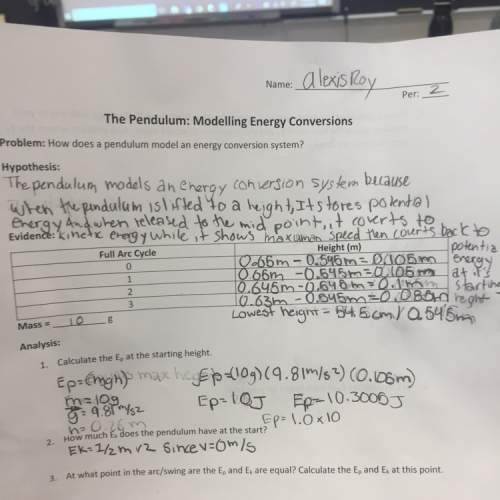
Physics, 21.02.2020 19:38 babyquinnz
A certain pond absorbs I = 940 W/m^2 for a time period of an hour from the sun. Assume that all of this energy is used to raise the temperature of the pond. The pond water fills a hemisphere of radius r = 2.25 m and has a density rho = 1000 kg/m63. The specific heat capacity of the pond water is r = 4.180 J kg-K. What is the change in temperature delta T in kelvin of the pond due to this energy transfer? What is the change to the internal energy of the pond delta U in joules, assuming that it does no work and loses no energy as heat? If the initial temperature of the pond was T = 20.0 degree C. what is the change in the entropy delta S in joules per kelvin of the pond? If the pond were at a temperature of T = 0. degree C, and covered by a d = 0.10 m thick layer of ice at this same temperature, how long delta t in hours would it take to melt the ice? The latent heat of fusion for ice is L_f = 334 kJ kg. and its density is rho_ice = 917 kg/m^3. Assume that the volume of ice is a cylinder of thickness d and cross-sectional radius r. If the thickness of the ice were doubled, would it take twice as long to melt the ice? If the radius of the pond were doubled, would it take longer to melt the ice? No. because the time it takes to melt the ice is inversely dependent on r. it would take longer to melt the ice if r were doubled. No. because the time it takes to melt the ice is linearly dependent on r. it would take longer to melt the ice if r were doubled. Yes. because the tune it takes to melt the ice is inversely dependent on r. it would take longer to melt the ice if r were doubled. There is not enough information. The time it takes to melt the ice is independent of r. Yes, because the tune it takes to melt the ice is linearly dependent on r, it would take longer to melt the ice if r were doubled.

Answers: 2


Another question on Physics

Physics, 22.06.2019 01:30
Ablock of mass 1.5 kg slides down an inclined plane that has an angle of 15. if the inclined plane has no friction and the block starts at a height of 3 m, how much kinetic energy does the block have when it reaches the bottom? acceleration due to gravity is g = 9.8 m/s2. a. 6.8 j b. 50.9 j c. 0 j d. 44.1 j
Answers: 1

Physics, 22.06.2019 02:30
The human body stores chemical energy from digested food. some of the chemical energy is converted into mechanical energy when the body moves. which statement best supported by this information
Answers: 3

Physics, 22.06.2019 06:00
A1,700kg car is being used to give a 1,400kg car a push start by exerting a force of 140n the impulse on the smaller car during the 30.0s of contact is +670kg*m/s. what is the impulse of the smaller car on the larger car? -814 kg*m/s 0kg *m/s -670kg*m/s -550kg*m/s
Answers: 1

Physics, 22.06.2019 09:00
When a bicycle coasts uphill, it moves slower and slower as it climbs. why? a. its kinetic energy is transforming into heat energy. b. its potential energy is transforming into kinetic energy. c. its kinetic energy is transforming into potential energy and heat energy. d. its potential energy is transforming into kinetic energy and heat energy.
Answers: 1
You know the right answer?
A certain pond absorbs I = 940 W/m^2 for a time period of an hour from the sun. Assume that all of t...
Questions

English, 29.06.2019 20:30


Mathematics, 29.06.2019 20:30

Social Studies, 29.06.2019 20:30

Mathematics, 29.06.2019 20:30

Health, 29.06.2019 20:30

Mathematics, 29.06.2019 20:30

History, 29.06.2019 20:30





Advanced Placement (AP), 29.06.2019 20:30


Mathematics, 29.06.2019 20:30


Mathematics, 29.06.2019 20:30


Mathematics, 29.06.2019 20:30




